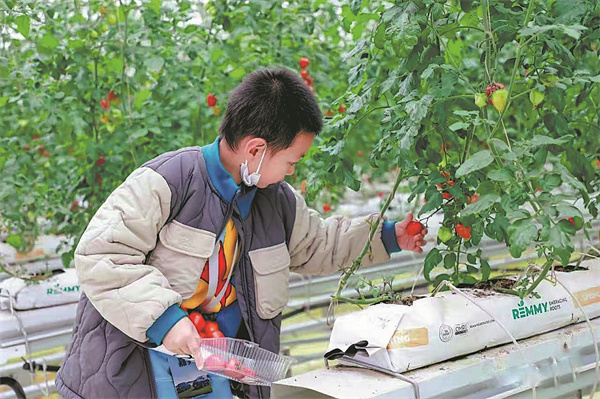Agricultural base connects people to land


As summer arrives, the Wanmu modern agriculture base in Dabu village in the Guangxi Zhuang autonomous region welcomes a steady stream of visitors seeking a connection to the land.
Inside a sprawling greenhouse of Qicai Manor, part of the base in Yanshan district in Guilin, students watched workers methodically tend to newly planted tomato seedlings in early May. Their rhythmic movements painted a scene of spring cultivation.
At the heart of this operation, digital numbers dance across a soil sensor display, intriguing many students.
"This soil sensor acts as the greenhouse's nervous system," explains Li Yongfa, technical director of the agricultural base.
"We can monitor real-time temperature data transmitted to the screens by embedding it into the soil. When temperatures rise, we open the vents; when they drop, we seal them to maintain precise climate control," Li says.
The instant responsiveness of the sensor enables optimized growing conditions, targeted fertilization, and proactive measures against late spring chills or pest outbreaks, ensuring consistent vegetable production, he adds.
Students saw the tangible benefits in the mature, plump tomatoes and cucumbers.
The modern cultivation of tomatoes, for example, not only guarantees eco-friendly growing and superior quality but also doubles yields compared to conventional methods, Li says.
Wang Chunxia, director of Guilin Pomelo Peel Nature Education, led dozens of students to the facility in May.
"Walking them through agriculture's evolution, we help children engage all five senses among the orchards," Wang says.
"Their wide-eyed wonder at smart farming technologies spoke volumes, which helps sharpen their perception of the world in profound ways," Wang adds.
She notes that when children can trace a vegetable's "life story" through agricultural technology, the traditional image of backbreaking farm labor is reinvented.
"The tour gives them a spiritual connection to the land in the digital age," she says.
Along with domestic visitors, foreign travelers have also made their way to the base.
Xiong Zuohua, general manager of Yuzi Paradise, a countryside resort in Dabu village, says international guests enjoy the distinctive features of China's smart agriculture at the base.
"This initiative allows our foreign friends to gain a deeper appreciation for our green, ecologically grown fruits and vegetables," Xiong says.
According to Jiang Yan, in charge of Qicai Manor's operations, Yanshan district has made significant strides in advancing large-scale, standardized modern agriculture through the Wanmu high-tech farming demonstration zone.
"The initiative enables us to develop premium, distinctive agricultural brands while enhancing market competitiveness," Jiang explains. "It directly increases farmers' incomes and contributes to rural vitalization efforts."
The project has achieved remarkable scale, cultivating over 10,000 mu (667 hectares) of land with trial plantings of diverse produce, including peppers and muskmelons.
Last year, the project contributed to a more than 3,000 yuan ($416) increase in per capita income through land transfers among the villagers.
In addition to being an agritainment site, the demonstration base has evolved into an integrated agricultural innovation hub, combining seedling cultivation, new variety selection, technology experimentation, farmer training, and smart farming equipment applications, Jiang notes.
Yanshan has leveraged its abundant natural resources and picturesque rural landscapes in recent years to create uniquely favorable conditions for the integrated development of agriculture, culture and tourism, says Xue Yuan, deputy head of Yanshan.
"This has established a comprehensive development model with agriculture as its foundation, culture as its soul, and tourism as its vehicle," Xue adds.
In addition to the Wanmu demonstration base, the district has established several flagship projects that exemplify this model, including experiences highlighting rural leisure, pastoral ballads, tea and flowers.
Huang Qiuqin, the on-site director of the Wanmu agricultural base, says it has already begun serving as a model for agricultural modernization.
The project's initial success has led to tangible expansion.
"We plan to extend this agriculture model to four villages in Yanshan," Huang says, adding that the expansion aims to create widespread economic benefits, ultimately increasing incomes for local farmers throughout the region.




































